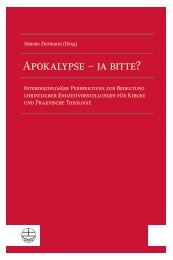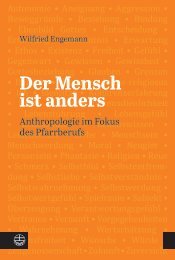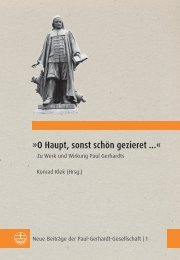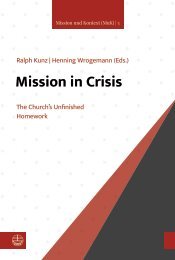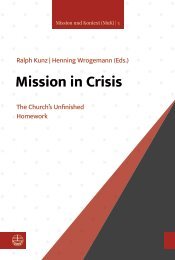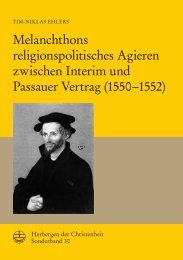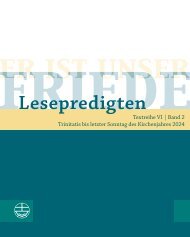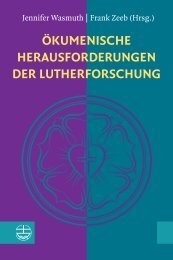Phillip A. Davis, Jr. | Daniel Lanzinger | Matthew Ryan Robinson (Eds.): What Does Theology Do, Actually? (Leseprobe)
You also want an ePaper? Increase the reach of your titles
YUMPU automatically turns print PDFs into web optimized ePapers that Google loves.
The <strong>What</strong> <strong><strong>Do</strong>es</strong> <strong>Theology</strong> <strong>Do</strong>,<br />
<strong>Actually</strong>? Project<br />
The <strong>What</strong> <strong><strong>Do</strong>es</strong> <strong>Theology</strong> <strong>Do</strong>, <strong>Actually</strong>? project aims not to do theology, but to<br />
observe what theologies do, around the world today, in and for the communities<br />
in which they circulate and hold meaning. How is theology understood and practiced<br />
as a semantics of global society? <strong>What</strong> kinds of problems do theologies<br />
solve and how? These questions are pursued, moreover, with specific attention<br />
given to the ‘‘transcultural’’. Much might be learned both about the role of Christian<br />
religion in public life and about evolving trends in theological understanding<br />
or praxis by examining comparatively the ways Christian communities encode<br />
transcultural experiences of irritation coming from the social environment<br />
(for example, climate change, protest movements, digitalization, mass migration,<br />
or global pandemics) into their self-understanding (for example, in engagement<br />
with received tradition) and self-formation (for example, in liturgy and community<br />
ethics).<br />
This requires theoretical open mindedness and methodological agility. The<br />
project therefore follows a two-step logic. First, the project seeks to observe theological<br />
work as itself a set of social discourses or objects contingently particular<br />
to certain contexts. A focus on answering the question ‘‘<strong>What</strong> is theology?’’ privileges<br />
those who already possess the resources and power to shape what counts<br />
as being ‘‘really’’ theology or not. By contrast, the descriptive approach preferred<br />
by the question ‘‘<strong>What</strong> does theology do?’’ objectifies ‘‘theologies’’ as a kind of<br />
social artifact and recognizes a variety of reflected religious communications as<br />
communicating theology. Second, in this way, the project aims to disrupt dominant<br />
paradigms in academic theological research, to expand the category of theological<br />
work(s) beyond textual formats and classroom or conference situations to<br />
include a variety of spaces, symbols, practices, and artifacts that function as<br />
transmitters of reflected religious communications, and to contribute to work<br />
diversifying theological methodologies to include empirical, qualitative, and<br />
quantitative research methods.<br />
The <strong>What</strong> <strong><strong>Do</strong>es</strong> <strong>Theology</strong> <strong>Do</strong>, <strong>Actually</strong>? project consists of symposia and a<br />
limited book series. An international, interdisciplinary community of scholars





